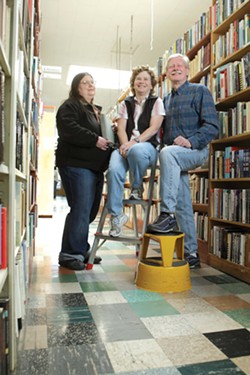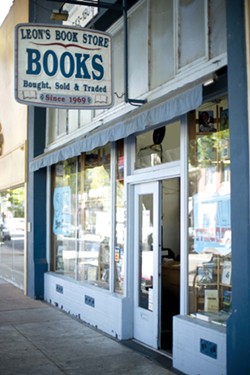Every good book, every popular story has a central conflict and resolution. Hercules tackles a fearsome to-do list and pays his penance. Jonah is partially digested by a whale and decides to finally follow omnipotent orders. Sam I Am overcomes a fear of garishly colored food and enjoys a green breakfast.

- STEVE E. MILLER
- THREE OF A KIND : Susie Metzler, left, has been manager of Leon’s Book Shop for the last 18 years. Catherine and Rick Wiegers have owned the building and store since 1985. A new chapter of their lives will start on May 20, when Leon’s closes its doors.
Whatever the ultimate genesis of the conflict, the resolution is clear: On May 20, Leon’s is closing. For good.
While all of the suspects on the list have had some hand in battering the local used-book business, Rick Wiegers—who owns Leon’s with his wife, Catherine, daughter of the Leon—points to tectonics as the lead culprit behind the closure.
"I would have stayed here until the end of time if not for the retrofit," he said.
He’s referring to the almost decade-long transformation of downtown San Luis Obispo, where about four score buildings are essentially being rebuilt—or at least reinforced—from the ground up. Anchored walls and steel frames will make the buildings safer when the next Central Coast temblor rocks the Richter Scale, but the process has forced many shops to suffer financial losses, or even disappear completely, because of business disruptions and rising rents.
Rick estimated that the retrofit would be about a $400,000 headache for Leon’s. After buying the building and paying it off over 10 years, he wasn’t willing to dive into such debt again. An investor recently bought the building at 659 Higuera St., and the Wiegers have no idea what will happen to it next.
Their own future is clearer. Rick isn’t going to do much of anything, besides enjoying his time, managing some online book sales, and catching up on his own reading. Catherine recently graduated from Cal Poly with a forestry degree and hopes to put it to use.
Before there were books
Leon’s Book Store began life as a toyshop when Leon Dyer bought the building in 1956. He put down distinctive, colorful flooring (still there today) and sold playthings until Thrifty’s came to town and muscled in on his niche. Dyer began replacing toys with books, and—as the sign hanging in front of the shop proudly notes—the business fully converted to a bookshop in 1969.
Catherine said that her dad decided to retire in the late ’70s, and her family took over the business. When they wanted out, Rick and she bought it. That was 1985.
The shelves used to groan under the weight of popular fiction, which filled an annex next door and then ultimately moved to a shop on High Street. Rick shut that location down two years ago, convinced that a successful used-book shop had to be downtown to survive.
Over the years at Leon’s proper, Rick tried to cultivate an everyman atmosphere. He was less interested in showing off rare and antiquarian specimens than in keeping the shop stocked with alphabetized, affordable books on a variety of subjects, from railroads to honeybees. Depending on what customers were bringing in to sell, sections expanded and contracted, were created or vanished just as easily. A retiring Cal Poly professor, for instance, could triple the psychology section with one visit.
Trends came and trends went, along with requisite fad books: Metaphysics. Crystals. Aromatherapy. Feng shui. Angels. Y2K. For a while, everyone was looking for The Bridges of Madison County. Years later, it was The DaVinci Code. They’re popular, and then they’re not, replaced by the next must-read.
"There are so many books out there, most people only come into contact with their interest range," Rick said. "We’ve found books on every single subject there is. You’d never think there’d be a book on flatulence. It’s staggering."
His boiled-down philosophy was to take books out of the hands of people who didn’t want them anymore and put them into the hands of people who did. Simple. Employees kept the sales flowing and the shop tidy. Rick maintained a huge overstock so the shelves would always be full.

- STEVE E. MILLER
"I always said I’d go into the feather business in my next life," Catherine said with a laugh. "Books are so heavy."
They ranged far and wide to find their inventory, and they haggled over novels, one by one, as customers brought them in for cash or store credit. The business was thriving and fulfilling.
"It used to be really fascinating because every day was an adventure," Rick said. "You never knew what was coming in."
The bulk of their customers was tourists, visitors from the San Joaquin Valley and beyond. Rick remembered one Navy retiree who would routinely drive up from Long Beach and spend his pension on stacks of books.
Then the world changed.
The curse of the Information Age
If Al Gore wants to take credit for inventing the Internet, he needs to be willing to shoulder some of the blame for the decline of used-book stores.
While talking about the history of their store, Rick and Catherine regularly referred to the time "before the Internet." Rick explained that online culture has overturned many of the basic principles behind a shop such as his. With a few exceptions, the Internet discourages I-was-looking-for-this-one-book-but-found-these-three-instead sort of discoveries.
"You don’t get the browsers in here anymore because of point-and-click," Rick said.

- STEVE E. MILLER
Then there’s the Kindle, Amazon’s wireless contraption that lets people download books in less than a minute and is being touted as the future of reading. Ray Bradbury may live to see at least some of his Fahrenheit 451 prophecies come true. One of his characters, living in a dystopian future ruled by constant streaming audio and visual entertainment, laments the loss of the smell of books, "like nutmeg or some spice from a foreign land."
Science fiction is bleeding into reality—people are building social networks across thousands of miles, spending hours in virtual realities, and can store thousands upon thousands of words on a single handheld device—and it’s making a noticeable impact. Rick said that he’s seen Leon’s Book Store’s business go down about 20 percent a year for the last five years.
"It’s just a general trend in California for used-book stores to go away," he said.
Bruce Miller, owner of Phoenix Books on Monterey Street, agreed. He said that he’s lost about 40 percent of his receipts since 2001, though he’s picked up 25 percent online. Between haggling and helping browsers search for specific titles on a sunny mid-May day—Kafka’s Metamorphosis, Dave Eggers’ Pulitzer-nominated A Heartbreaking Work of Staggering Genius—he estimated that 30 or so of the biggest, most established, and heavily trafficked used-book stores in the state have closed in the last couple of years.
"That does not happen in even a so-so market," he said. "That happens when the market changes."
The Book Baron in Anaheim no longer maintains a retail store. Business has moved online.
Acorn Books in San Francisco closed shop after decades of sales.
Acres of Books in Long Beach has been reducing its stock and is moving out of the shop the owner’s grandfather moved into in 1964. "We are now on eBay," the website announces. Elsewhere, the site details three generations of ownership, a cultural heritage landmark designation, and the claim of being the largest used-book shop in California, boasting a stock of more than 1 million books.
And so it goes. The Wiegers said that one Leon’s customer who takes used-book-buying road trips up and down California’s coast told them that he has to drive longer between stops these days.
Before they go
There hasn’t been a mass buyout in Leon’s Book Store’s final weeks; no distant shop bought the entire inventory to cart away in heavy boxes and alphabetize on some faraway shelf.
Rick said that they’re simply trying to get rid of all the books. In fact, they’re selling just about everything, including the kitchen sink—or at least a refrigerator in the back. That clock over the door? It’s for sale. So are the photos of authors hanging on the ends of shelves. Truman Capote was the first to go, but Louisa May Alcott was still there on May 13, Leon Dyer’s birthday, a week before closing.
Everything has been listed at 20 percent off, too—with more discounts on the way—so if you’ve been eyeing that $250 boxed compact edition of the Oxford English Dictionary (A-O and P-Z, with a supplement, bibliography, and built-in shelf with a magnifying glass), strike now. The same goes for Islamic Metalwork. And A Practical Guide to Ferret Care. And The World Atlas of Golf.

- STEVE E. MILLER
Throughout the morning, a steady trickle of customers brought goodbyes and thanks. One dropped off a card.
"Most people are saddened by the closure," Rick said.
Still, he reasoned, of all the ways for a bookstore to close, this has been a pretty smooth transition.
"It’s kind of like a wake," he said. "I’m not happy that it’s going, but … ." He trailed off.
Rick cited his best memories in the shop as the customers he interacted with over the years. Catherine and he watched patrons grow from children into parents with families of their own, shopping for old favorites and new tales to explore.
Susie Metzler, encyclopedic manager of the shop for the last 18 years, doesn’t know what she’s going to do next. She’s leaving what she calls the best job in the universe.
Catherine’s lament was simple: "I’m going to miss being the owner of so many books."
Not gone completely
Many great stories end with a denouement, when everything is revealed and there are no surprises or questions left for the reader. The slipper fits and Cinderella lands the prince while her stepsisters are shamed or get their eyes pecked out by birds, depending on which version you read. Romeo and Juliet die from poisoning and stabbing, respectively. Harry Potter … well, I won’t ruin it in case you still haven’t finished the seventh book.
Leon’s Book Store’s denouement isn’t completely tidy, but it does offer an answer for anyone wondering whether a bookstore with such history and gravity can ever truly fade away.
Despite Rick’s online reluctance ("The Internet’s no fun. Don’t do the Internet."), he will use the Web to continue to sell rare, signed, and antiquarian books that he’s been saving over the years. Such items were never the focus of the physical shop, but will make up what’s essentially his retirement and the last ethereal glimmer of the near-40-year San Luis Obispo fixture.
"We have an online system, so some of the out-of-print and collectible books will be listed online, but that’s different. That’s more of a business, while this," he said, motioning to the shelves around him, "is more of a family operation."
It’s not quite "happily ever after," but it’s not completely "The End" either.
Friends of books
In an 11th hour celebration of the written word, current and past employees, and loyal customers, Leon’s Book Store is donating all of its proceeds from sales on May 17, 18, and 19 to the San Luis Obispo Friends of the Library. Visit the shop at 659 Higuera St. in downtown San Luis Obispo.
Executive Editor Ryan Miller thanks Leon’s for introducing him to William Gibson, bettering his relationship with Italo Calvino, and helping him expand his connection with T.H. White. Send comments to [email protected].
Comments